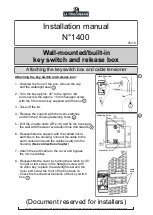
Technical Guide for Limit Switches
Dog Design
Speed and Angle of Dog and Relationship with Actuator
Before designing a dog, carefully consider the operating speed and angle of the dog (
φ
) and their relationship with the shape of the actuator. The
optimum operating speed (V) of a standard dog at an angle of 30
°
to 45
°
is 0.5 m/s maximum.
Roller Lever Switches
(1) Non-overtravel Dog
Note: The above y values indicate the ratio ranges based on TT (total travel).
Therefore, the optimum pressing distance of the dog is between 50% and
80% (or 50% and 70%).
(2) Overtravel Dog
If the speed of the overtravel dog is comparatively high, make the rear
edge of the dog smooth at an angle of 15
°
to 30
°
or make it in the
shape of a quadratic curve. Then lever shaking will be reduced.
Note: The above y values indicate the ratio ranges based on TT (total travel).
Therefore, the optimum pressing distance of the dog is between 50% and
80% (or 50% and 70%).
Plunger Switches
If the dog overrides the actuator, the front and rear of the dog may be
the same in shape, provided that the dog is not designed to be
separated from the actuator abruptly.
Fork Lever Lock Models
Note: Design the shape of the dog so that it does not come in contact with the
other roller lever when the actuator is inverted.
Dog speed: 0.5 m/s max. (standard speed)
Dog speed: 0.5 m/s
≤
V
≤
2 m/s (high speed)
θ
φ
V max. (m/s)
y
45
°
45
°
0.5
0.5 to 0.8 (TT)
50
°
40
°
0.6
0.5 to 0.8 (TT)
60
°
to 55
°
30
°
to 35
°
1.3
0.5 to 0.7 (TT)
75
°
to 65
°
15
°
to 25
°
2
0.5 to 0.7 (TT)
Dog speed: 0.5 m/s max.
Dog speed: 0.5 m/s min.
θ
φ
V max. (m/s)
y
45
°
45
°
0.5
0.5 to 0.8 (TT)
50
°
40
°
0.6
0.5 to 0.8 (TT)
60
°
to 55
°
30
°
to 35
°
1.3
0.5 to 0.7 (TT)
75
°
to 65
°
15
°
to 25
°
2
0.5 to 0.7 (TT)
φ
Lever set
vertically
φ
V max. (m/s)
y
30
°
45
°
60
°
60
°
to 90
°
0.4
0.25
0.1
0.05 (low speed)
0.8 (TT)
80% of to-
tal travel
φ
Change lever set angle (
θ
)
according to dog angle (
φ
)
φ
φ
Lever set
vertically
φ
V max. (m/s)
y
30
°
45
°
60
°
60
°
to 90
°
0.4
0.25
0.1
0.05 (low speed)
0.8 (TT)
80% of to-
tal travel
15 to 30
°
60
°
max.
φ
Roller Plunger
Ball Plunger
Bevel Plunger
φ
φ
V max. (m/s)
y
30
°
20
°
0.25
0.5
0.6 to 0.8 (TT)
0.5 to 0.7 (TT)
φ
φ
V max. (m/s)
y
30
°
20
°
0.25
0.5
0.6 to 0.8 (TT)
0.5 to 0.7 (TT)
φ
Note: The above y values indicate the ratio
ranges based on TT (total travel).
Therefore, the optimum pressing
distance of the dog is between 60%
and 80% (or 50% and 70%).
φ
V max. (m/s)
y
30
°
20
°
0.25
0.5
0.6 to 0.8 (TT)
0.5 to 0.7 (TT)
60
°
27.6
10
Dog
45
°
45
°
http://www.ia.omron.com/
C-7
(c)Copyright OMRON Corporation 2007 All Rights Reserved.































